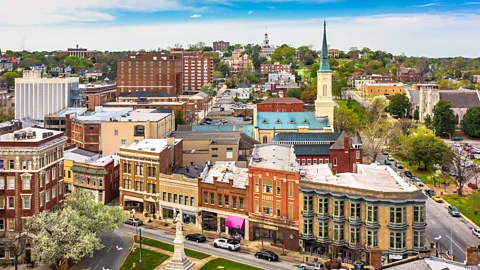Five countries helping you reconnect you with your roots
As DNA ancestry kits like Ancestry and 23andMe become more affordable and accessible, a growing number of people are engaging in “heritage tourism,” traveling to connect with the regions their ancestors once called home. This trend offers a unique way to explore genealogy and personal history while supporting sustainable tourism.
By providing detailed insights into genetic heritage, these tests empower people without direct genealogical knowledge to visit the places that shaped their lineage. Heritage tourism is also being hailed as a sustainable alternative to overtourism, with destinations often located in lesser-visited regions. In Europe, the push for “roots tourism” has gained momentum, helping smaller villages benefit from tourism while promoting local economic development.
Travel agencies are tapping into this demand, offering personalized heritage tours. In 2021, Kensington Tours partnered with Ancestry.com to curate heritage trips to destinations such as Italy, Germany, Japan, and Ghana. These experiences include professional genealogists to help uncover family stories and meaningful sites. “Roots travel really surged in 2022 after the pandemic, as families sought to reconnect through meaningful journeys,” said Debra Loew from Kensington Tours.
While Europe has long promoted ancestry-based travel, other countries are launching innovative initiatives to help visitors trace their roots. Here are a few standout destinations embracing heritage tourism:
Italy

With an estimated 80 million people worldwide claiming Italian ancestry, Italy has declared 2024 the “Year of Italian Roots in the World.” The Italian Ministry of Tourism launched Italea, a platform guiding visitors through the country’s 20 regions with resources to uncover family origin stories.
Marino Cardelli, founder of Experience BellaVita, a travel agency specializing in Italian genealogy, said, “Heritage travel is the foundation of my business—over 95% of our focus.” Although uncovering Italian ancestry can be challenging due to migration and wartime destruction, Italy’s extensive civil and parish records, some dating back to the 1400s, can often lead to surprising discoveries, including living relatives.
Ghana

As the historic epicenter of the transatlantic slave trade, Ghana has become a focal point for members of the African diaspora seeking to connect with their roots. Initiatives like the Year of Return in 2019 and The Joseph Project have drawn thousands of visitors.
DNA testing has amplified interest, helping African descendants identify specific regions and ethnic groups tied to their ancestry. Ghana’s heritage tours, such as Kensington’s “Door of No Return Ancestral Journey,” include visits to sites like Elmina Castle—once a holding area for enslaved people—and opportunities to learn about cultural traditions and migration patterns.
Scotland

Scotland, home to more than 40 million descendants worldwide, attracts millions of heritage travelers annually. According to Visit Scotland, 70% of long-haul visitors come to explore their ancestry. Many report feeling a deep sense of belonging upon arrival, often inspired by popular shows like Outlander.
The government-supported Scotland’s People platform allows travelers to search historical records by name and year. For those tracing their clan names, local businesses like Scots Clan offer detailed resources, including tartans and associated landmarks. The Explorer Pass by Historic Environment Scotland grants access to over 30 sites, from ancient settlements to medieval castles.
India

With a diaspora of 18 million, India has launched new initiatives to reconnect with its global population. One notable example is the Pravasi Bharatiya Express, a government-funded tourist train for those of Indian origin, departing on January 9, 2025, in honor of Mahatma Gandhi’s return to India. The train will visit key cultural and religious sites, offering participants a three-week journey rich in heritage.
India’s post-pandemic tourism boom includes a significant increase in Indian Americans traveling back to connect with family and history. Roots tourism is poised to remain a key driver of the country’s tourism growth.
United States

The U.S. has also embraced heritage tourism, particularly for Indigenous peoples. Macon, Georgia, for example, was once home to 60 villages of the Muscogee (Creek) Nation, who were forcibly relocated under the Indian Removal Act of 1830. Today, Macon is working with the Muscogee Nation to preserve and honor these historic lands.
Ocmulgee Mounds National Historical Park, which spans 17,000 years of history, is central to this effort. Plans are underway to designate it a national park co-managed by the Muscogee Nation, a first of its kind. Local initiatives, such as bilingual English-Creek street signs and hiring preferences for Muscogee citizens, further deepen these connections.
Heritage tourism offers travelers an opportunity to bridge the gap between past and present, discovering their origins while supporting smaller communities and cultural preservation. Whether tracing family lines in a quiet Italian village, standing in solemn reflection at Ghana’s slave trade sites, or reconnecting with ancestral lands in Macon, Georgia, this growing trend is reshaping travel in meaningful ways.